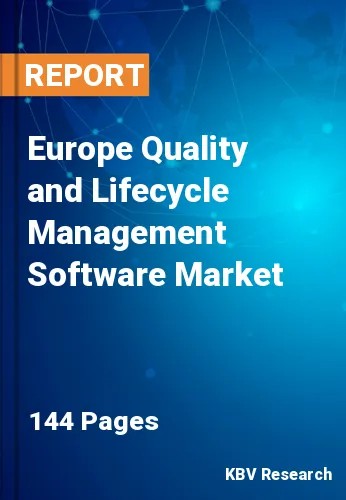The Europe Quality and Lifecycle Management Software Market would witness market growth of 6.9% CAGR during the forecast period (2022-2028).
Companies recognize their need for an inclusive QMS to boost productivity and gain a competitive edge. Therefore, they are considering and funding quality management software solutions in a foresighted manner to guarantee that quality standards are upheld throughout the entire product lifecycle. As a result, they are driving the demand for quality management software. The standard capabilities of QMS have been improved in terms of cost-efficiency, flexibility, scalability, and platform independence, among other things, by technological advancements like cloud computing, analytics, and big data.
As a result, end-use industries like manufacturing, life sciences, telecom & IT are quickly acquiring software solutions, accelerating the market's growth. It is projected that the implementation of quality management systems (QMS) across end-use industries will increase due to the rigorous adherence to quality management standards and international technical specifications like IATF 16949, AS9100 Rev.D, and ISO 9001. Also, the C-level executives representing organizations seek to orient quality management software with strategic business objectives, supporting a constant market expansion.
In Germany, the current automotive industry is shaped by the increasing popularity of electric vehicles and the soaring demand for better safety, connection, comfort, and driver assistance technologies. OEM manufacturers intend to expand their German production locations. In addition to prioritizing the automotive sector as a significant revenue producer, the German government is encouraging foreign direct investment in the automotive sector. As a result, the German vehicle industry is one of the most attractive and fastest-growing in the continent. Several factors, like labor availability, geographic advantage, R&D activities, and government assistance, promote the German automobile sector. This is leading to regional market growth.
The Germany market dominated the Europe Quality and Lifecycle Management Software Market by Country in 2021, and would continue to be a dominant market till 2028; thereby, achieving a market value of $3,053.3 million by 2028. The UK market is exhibiting a CAGR of 6% during (2022 - 2028). Additionally, The France market would exhibit a CAGR of 7.7% during (2022 - 2028).
Based on Component, the market is segmented into Solution and Services. Based on Solution Type, the market is segmented into Quality Management, Document & Product Data Management, Bill of Material (BOM) Management, Governance & Compliance Management, Cost Management, Change Management, Lifecycle Analytics Management and Others. Based on Enterprise Size, the market is segmented into Large Enterprises and Small & Medium Enterprises. Based on Deployment Type, the market is segmented into Cloud and On-premise. Based on Vertical, the market is segmented into Automotive & Transport, Industrial Manufacturing, Consumer Goods & Retail, Healthcare & Lifesciences, Aerospace & Defense, IT & Telecom and Others. Based on countries, the market is segmented into Germany, UK, France, Russia, Spain, Italy, and Rest of Europe.
Free Valuable Insights: The Worldwide Quality and Lifecycle Management Software Market is Projected to reach USD 46.9 Billion by 2028, at a CAGR of 7.3%
The market research report covers the analysis of key stake holders of the market. Key companies profiled in the report include IBM Corporation, Microsoft Corporation, SAP SE, Siemens AG, Dassault Systemes SE, Autodesk, Inc., PTC, Inc., Aras Corporation, SAS Institute, Inc., and Parasoft Corporation.
By Component
By Enterprise Size
By Deployment Type
By Vertical
By Country
Our team of dedicated experts can provide you with attractive expansion opportunities for your business.

